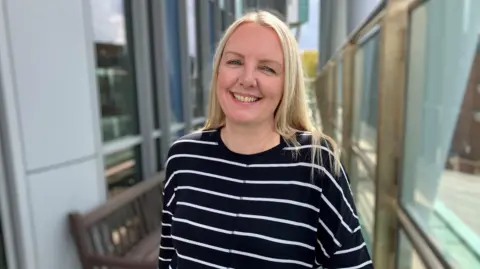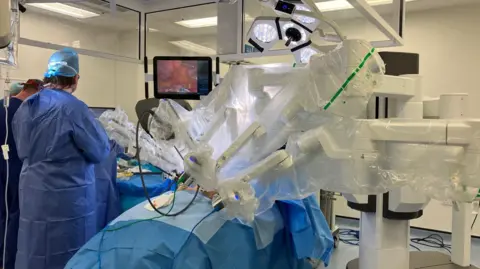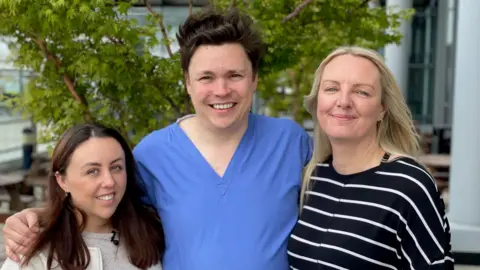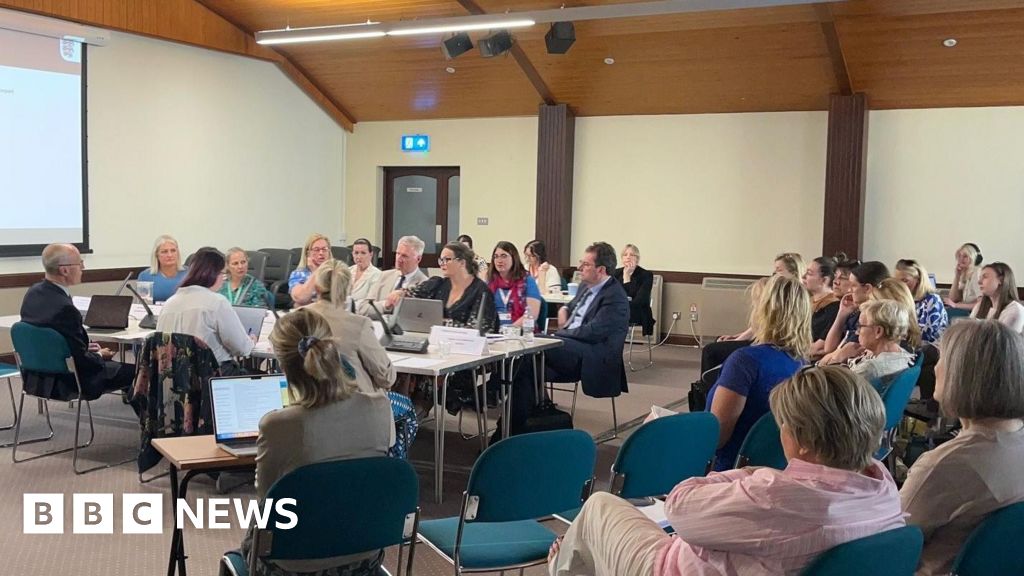ARTICLE AD BOX
Olivia Richwald
BBC News, Yorkshire

 OLIVIA RICHWALD/BBC
OLIVIA RICHWALD/BBC
Stacey, 47, from Leeds has suffered from endometriosis for 25 years
A woman who lost a kidney, her womb and parts of her vagina and bowel due to endometriosis has urged others to fight for a diagnosis of what she has described as a "silent assassin".
Stacey, 47, from Leeds, started developing the symptoms of the disease 25 years ago, but it was not finally confirmed until 2010.
In 2022, she had a full hysterectomy to remove her ovaries and womb, but the disease returned and she underwent robotic surgery late last year after being told her right kidney had failed.
Stacey, who said she was now doing well, urged other women to get help and support if they had any concerns: "Don't ignore it, listen to your body, go seek help."
Endometriosis is a condition in which cells similar to those lining the womb grow in other parts of the body, usually in the pelvic area.
Symptoms include severe pain and heavy periods and about 1.5 million women in the UK are thought to have the condition.

 OLIVIA RICHWALD/BBC
OLIVIA RICHWALD/BBC
A gynaecology patient has surgery in a robotic theatre at Leeds General Infirmary
Stacey said that before her latest surgery in November, her urologist had told her she had probably been suffering from kidney failure for six months.
"But I had no pain, no infections, nothing that suggested there was anything wrong with that kidney, so it was silent assassin," she said.
Stacey had the robotic surgery at Leeds General Infirmary in November 2024, with a team of doctors from three disciplines involved in the operation.
It was carried out using a robot with four mechanical arms and it took four hours to complete. Stacey was discharged the following day.
James Tibbott, clinical lead for gynaecology at Leeds Teaching Hospitals, who performed Stacey's surgery, said her condition prior to the operation was "the stuff of nightmares, in the nicest possible way".
"Stacey's disease was incredibly interesting because there was a lesion on the bowel, full thickness through the vagina, which then swept around to the right to take out the right kidney," he explained.
Mr Tibbot said carrying out keyhole surgery on Stacey "would have been almost impossible, or would have taken the whole day of operating".

 OLIVIA RICHWALD/BBC
OLIVIA RICHWALD/BBC
Surgeon James Tibbott was recently reunited with patients Aimee Bullock (left) and Stacey (right)
Aimee Bulloch, 29, from Liversedge, also underwent robotic surgery at Leeds Teaching Hospitals in November last year after having first developed endometriosis symptoms at the age of 14.
Ms Bulloch, whose mother also had the condition, said: "I had watched my mum going through the same thing growing up, so I had a brief idea of what it might have been.
"It was put down to irritable bowel syndrome. I was told painful periods were normal and I would grow out of it, but it continued to get worse the older I got."
Ms Bulloch said she eventually found herself "struggling with basic bodily functions".
"Going to the toilet was difficult. I wasn't able to go out without knowing where the toilets would be. The pain was excruciating."
Ms Bulloch's endometriosis eventually affected her bowel, appendix and left ovary.
After undergoing the robotic surgery at Leeds Teaching Hospitals, she said she was much better and she believed her fertility should be unaffected.
'Listen to your body'
The Leeds Teaching Hospitals trust has just been awarded provisional status as an accredited endometriosis treatment centre by the British Society for Gynaecological Endoscopy.
Mr Tibbott said the use of the robotic operating theatre was enabling more patients such as Stacey and Ms Bulloch to be treated - and they were recovering more quickly.
In fact, he said, he was recently able to perform surgery on six patients in just one day.
Stacey and Ms Bulloch both recently met each other for the first time.
They said they were doing well and although there was currently no cure for endometriosis, they hoped theirs would be well managed in the future.
Stacey said her priority was now to keep her remaining kidney healthy.
She said any woman who was worried about endometriosis should take action as soon as possible.
"Don't ignore it. Listen to your body, go seek help," she said.
"Go through your GP. If you are not happy with that type of consultation that you have, try again with someone else.
"Keep banging the drum. You have to advocate for yourself."

 6 hours ago
4
6 hours ago
4








 English (US) ·
English (US) ·